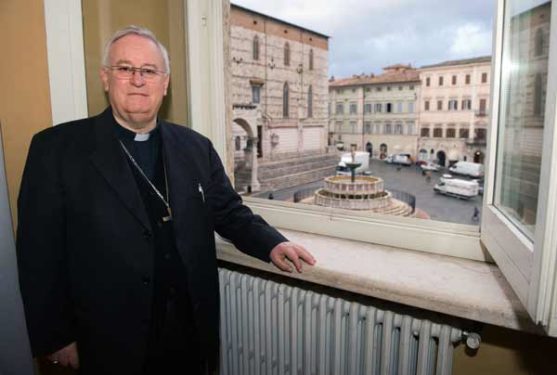By Claire Giangrave
ROME (Crux) – Italian bishops have concluded their Nov. 12-14 extraordinary assembly. New guidelines on the question of clerical sexual abuse were discussed and presented, with the creation of a National Advisory Center to aid bishops and the promise to make a “more radical evangelical choice” in terms of prevention.

“Woe to whoever touches children!” said Italian Cardinal Gualtiero Bassetti, president of the Italian Episcopal Conference (CEI), during a press conference Nov. 15, adding that clerical sexual abuse “is a problem that the Italian Church intends to resolve in radical terms.”
At Pope Francis’ request, the Italian episcopacy was asked to create new guidelines on clerical sexual abuse to be added to the already existing ones published in 2014 and focusing primarily on prevention, information and education.
Italian bishops were presented with the new guidelines, which were created by an ad hoc commission, and will take them back to their dioceses to evaluate them until the next episcopal gathering in May 2019.
The guidelines will not be made public until the bishops approve them by vote, though Cardinal Bassetti said that he intends to bring some of its content to the Feb. 21-24 summit of representatives from episcopal conferences from around the world that will focus solely on the clerical sexual abuse crisis.
Some points from the guidelines have already been approved by CEI, including the creation of a national advisory center composed of lay and religious members who will serve as a sounding board for bishops and dioceses.
“The scope of the center is to evaluate the charges, but also to shed light on the situation,” Cardinal Bassetti said, stating that in the past the Vatican’s Congregation for the Doctrine of the Faith was the only body receiving accusations, with the result of being inefficient in addressing credible cases while also allowing “opportunists” to get away with false charges.
“In the past, we thought too much about the scandal,” the cardinal added, “as the Gospel says, scandals should not happen, but if they do then they must be clear, so that truth may triumph. This calls all of us to a greater transparency, education, [and] to change style.”
Asked about the number of sex abuse cases in Italy, Cardinal Bassetti said he didn’t know how extensive the phenomenon is. While several instances of clerical sexual abuse have emerged over the years, the matter remains largely a backburner issue for clergy who often find foreign media’s coverage of the matter to be “inflated” and “obsessive.”
Different Cultural Situation and Society
Italy “isn’t like the United States or Ireland,” Cardinal Bassetti said, adding that the handling of sexual abuse in the country must pass through the filter of a “different cultural situation and society.”
The guidelines, which Cardinal Bassetti described as “exhaustive and complete,” usher in a new chapter in Italy’s handling of sexual abuse, not just with the creation of the center, but also in terms of formation of laity and clergy as well as bishop accountability. The latter has been a significant stumbling block for the Italian Church.
“In Italy this issue is not found on the front pages, judging by the attention that it garners in public opinion and perception,” said German Father Hans Zollner, President of the Center for Child Protection (CCP) during a conference at the Pontifical Gregorian University in Rome Oct. 15.
“We hope that the Italian Church on this issue may propose something that goes beyond legal issues,” he added.
Father Zollner and the CCP counseled the Italian bishops on how to address the question of clerical sexual abuse.
Referring to the Pontifical Commission for the Protection of Minors, led by U.S. Cardinal Sean O’Malley of Boston, Mass., Cardinal Bassetti said that the work done so far by the Italian bishops has been “praised.”
Competence, Science and Conscience
“The Vatican verified that we are moving along the right line,” he said, insisting that actions must be taken with “competence, science and conscience.”
Among the drafters of the new guidelines is Italian Father Fortunato Di Noto, a globally renowned figure in the fight against pedophilia, who told Crux “to have much faith” in the national centers that will be set up in every diocese and region.
“It’s a difficult job, for the victims, [because] prevention and formation can’t simply be delegated to the center at the Gregorian,” Di Noto said Nov. 15. “It’s necessary to have formation not only for leaders but also for the people.”
Father Di Noto is the founder of a non-profit organization, Meter, which has been instrumental in raising awareness and combating sexual abuse globally. Just last week, Meter provided 170 priests and 500 catechism instructors with formation on how to recognize and handle sexual abuse cases.
The new guidelines represent “a journey that must be made with determination, clarity and strong operational transparency,” Father Di Noto said.
Meter claimed to be “excited and particularly satisfied” about the creation of the new center. It was 2002 when Di Noto created the first diocesan service for the protection of minors in Italy, and the fact that CEI is furthering that project “is a sign that we are moving, working,” he said.
